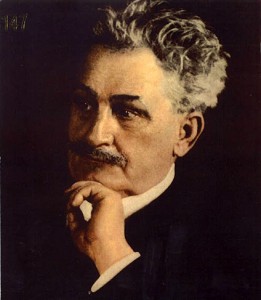
Composer Leoš Janáček (1854-1928) has been called “a Czech Debussy” but that title doesn’t completely capture the breadth and scope of his music. Early on, Dvořák was a major influence on him, even though Janáček was only 13 years younger than the composer of the New World Symphony. But as Janáček matured, his compositions went off in new directions — away from 19th-century Romanticism and into 20th-century folk realism, a unique sound world of Janacek’s own making.
 Like Sibelius, Janáček was clearly an outsider to the mainstream of European music, as represented by Strauss, Mahler or even Schoenberg. Janáček wrote in a style that’s impossible to pigeonhole. His very complex rhythms, inspired by Czech speech patterns, are completely his own — unlike those of any of his contemporaries. His music has roots in Moravian folk song and rightfully so — he was a true folklorist, lifelong collector of the regional melodies of his homeland. He lived most of his life in the 19th century, and yet his compositional voice is one of the most strikingly original of the composers writing in the early 20th century.
Like Sibelius, Janáček was clearly an outsider to the mainstream of European music, as represented by Strauss, Mahler or even Schoenberg. Janáček wrote in a style that’s impossible to pigeonhole. His very complex rhythms, inspired by Czech speech patterns, are completely his own — unlike those of any of his contemporaries. His music has roots in Moravian folk song and rightfully so — he was a true folklorist, lifelong collector of the regional melodies of his homeland. He lived most of his life in the 19th century, and yet his compositional voice is one of the most strikingly original of the composers writing in the early 20th century.
For the most part, his greatest compositional achievements came late in life. His first successful opera, Jenůfa, had its premiere in Brno in 1904 — one year before Richard Strauss’ Salome officially served notice that the 20th-century was indeed underway. Janáček, who was 50 at the time, felt that Brno was hardly the cultural capital that the premiere of his opera deserved but it took until 1916 for Jenůfa to get a performance at the National Theatre in Prague. That performance established Janáček as a major figure in Czech music, alongside Smetana and Dvořák.
During the summer of 1917, Janáček met and fell in love with Kamila Stösslová, a married woman 38 years his junior. He wrote letters to her daily, thousands of letters in all, which she rarely answered. Despite her seeming indifference, she somehow managed to be Janáček’s muse. Over the next decade, he turned out one masterpiece after another.
Janáček wrote nine operas. From the House of the Dead (the CSO will perform the opera’s overture April 10-13) was his last. He translated the Dostoyevsky novel himself. The opera didn’t receive its premiere until 1930, two years after Janáček’s death. Its overture is seven minutes of both harmonic and rhythmic surprises that engage the ear and leave the listener craving more.
With the Sinfonietta, which the CSO will perform April 10-13, Janáček fulfilled a commission from the organizers of the Sokol Gymnastic Festival. His Sinfonietta is indeed festive, but in a purely Janáčekian sense. It’s a big, sprawling, five-movement work written for a super-size orchestra (nine trumpets!). Like all of his other compositions, it’s unmistakably his.
Chicago-based writer Jack Zimmerman has authored a couple of novels, countless newspaper columns and was the 2012 recipient of the Helen Coburn Meier and Tim Meier Arts Achievement Award. He currently works as subscriber relations manager for Lyric Opera of Chicago.
VIDEO: Overture from Janacek’s “From the House of the Dead,” as performed at the Metropolitan Opera, via YouTube.